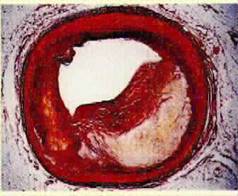For a generation and more, scientists and the layman alike have labelled saturated fats as “bad”, for they perceive that these fats clog your arteries and cause heart attack and stroke. Lately, findings from many clinical studies have indicated otherwise.
Many dietary oils could in fact be our “good” friends and help to save us from developing atherosclerosis, a disease whereby the artery (blood vessel) wall thickens as a result of invasion and accumulation of white blood cells called “phagocytes”.
Dietary fats actually play a vital role in influencing the binding of monocytes (white blood cells) to cell adhesion molecules (proteins in the arterial cell membrane). As a result, the monocytes fail to enter into the arterial cell wall (“endothelium”) The absence of phagocytes could curb the development of foam cells, fatty streaks, and eventually atherosclerosis.  A/Prof Tony Ng Kok Wai, lecturer from International Medical University’s Department of Nutrition and Dietetics, and Dr Verna Lee Kar Mun, IMU’s Clinical Professor have recently published a paper on how certain dietary oils could save us from developing atherosclerosis. In their study, they investigated the effects of high-protein Malaysian diets prepared separately with virgin olive oil (OO), and the saturated fats palm olein (PO) and coconut oil (CO) on the activities of cell adhesion molecules, thrombogenecity (ability to cause blood clotting), and other non-lipid markers of atherosclerosis. View the paper at http://www.nature.com/ejcn/journal/vaop/ncurrent/full/ejcn201526a.html The study was carried out on three experimental groups, comprising a total of 45 men and women, which were provided with each of the three test oils for a period of 5 weeks. From this study, it was found that for fasting and non-fasting blood samples, no significant differences were observed on the effects of the three test-fat diets on thrombaxane B2 (TXB2), TXB2/PGF1α ratios and soluble intracellular and vascular cell adhesion molecules. The OO diet induced a significantly lower favourable plasma leukotriene B4 (LTB4) compared with the other two test diets, whereas PGF1α concentrations were significantly higher (beneficial effect) at the end of the PO diet compared with the OO diet.
A/Prof Tony Ng Kok Wai, lecturer from International Medical University’s Department of Nutrition and Dietetics, and Dr Verna Lee Kar Mun, IMU’s Clinical Professor have recently published a paper on how certain dietary oils could save us from developing atherosclerosis. In their study, they investigated the effects of high-protein Malaysian diets prepared separately with virgin olive oil (OO), and the saturated fats palm olein (PO) and coconut oil (CO) on the activities of cell adhesion molecules, thrombogenecity (ability to cause blood clotting), and other non-lipid markers of atherosclerosis. View the paper at http://www.nature.com/ejcn/journal/vaop/ncurrent/full/ejcn201526a.html The study was carried out on three experimental groups, comprising a total of 45 men and women, which were provided with each of the three test oils for a period of 5 weeks. From this study, it was found that for fasting and non-fasting blood samples, no significant differences were observed on the effects of the three test-fat diets on thrombaxane B2 (TXB2), TXB2/PGF1α ratios and soluble intracellular and vascular cell adhesion molecules. The OO diet induced a significantly lower favourable plasma leukotriene B4 (LTB4) compared with the other two test diets, whereas PGF1α concentrations were significantly higher (beneficial effect) at the end of the PO diet compared with the OO diet.
Based on the above findings, A/Prof Tony and team members concluded that the common perception that saturated fatty acids are thrombogenic compared with unsaturated fatty acids may not be generally true. Besides that, it may also be premature to label PO and CO as “bad oils” which contribute to an increase in cardiovascular heart disease risk based solely on their effects on blood lipids.









